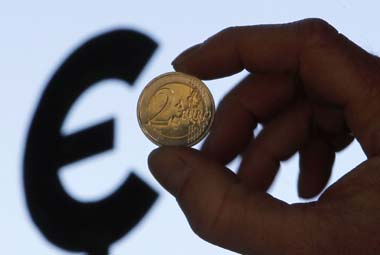By George Albert
The markets thumbed their noses by selling off after the decision of the European Central Bank (ECB) and Bank of England (BoE) to ease money supply. This was exactly the opposite of what the equity markets usually do.
After most monetary easing decisions, the equity markets rally due to the basic fact that more money chases the same amount of shares. However, over the past two days, the equity markets sold off, clearly focusing on the core problem of Europe - high debt ratios that crimp the chances of future growth and, of course, the shaky government finances that can lead to a disorderly default.
After the ECB cut interest rates and the BoE initiated a bond-buying programme to inject liquidity into the system, the markets rallied briefly and then sold off. The selloff was acerbated after the employment growth figures in the US disappointed.
Since Thursday, after the easing in Europe, the German index DAX fell to 6,410 from 6,578, a 168-point fall. The UK index FTSE 100 fell to 5,662 from 5,718, the French benchmark index CAC 40 fell to 3,168 from 3,276, and Spain’s IBEX 35 had a massive fall to 6,738 from the week’s high of 7,219. Asian shares too pulled back despite the easing.
[caption id=“attachment_370780” align=“alignleft” width=“380”]  The market seems to understand that just easing alone will not help the fundamentals of a weak economy. Reuters[/caption]
The market seems to understand that just easing alone will not help the fundamentals of a weak economy. Does this mean that the market will be very punishing shares from here on? It’s not yet time to make that proclamation. There is still the US Federal Reserve that is standing by to ease if the situation gets bad. The Federal Reserve is the de facto central bank of the world as a lot of trade is invoiced in dollars. When the Federal Reserve goes into another round of easing, we could see equity markets rally.
As had been proven in the past, monetary easing is not a long-term solution for the economic woes of the western world. Easing and bailouts provide temporary relief, but once the easing programme is completed, the markets sell off again. What is needed is a long-term sustainable growth plan where the government is small and the private sector is big and regulations few.
The last time a European country did it was when Germany reformed its stifling labour laws between 1998 and 2005 under Chancellor Gerhard Schrder. He also cut welfare and reduced taxes. The fruits of that reform are still being felt in Germany, which is country that the whole of Europe looks to for saving the continent.
But southern Europe still wants to party on the back of Germany. And as the resistance of Germany wanes the market punishes the whole continent.
In the meanwhile, the easing in Europe and in the US in the near future will fuel asset price increases in emerging economies like India, China and Brazil. We could see money flowing into India to take advantage of better growth in the country than the west. The stock market could rise in the short term, but face huge swings that hot money always brings.
The rupee already saw the benefit of the easing as it began to rally on the news of potential ECB and BoE easing. From a low of 57.33 against the dollar, the rupee rallied all the way up to the mid-54s before falling to 55.40 on Friday. However, the rise of the rupee against the euro and British pound has been more dramatic. The rupee rose to 68.08 on Friday from 70.50 on Monday against the euro. In the same period the rupee rose to 85.81 from 87.70 against the British pound. Further easing by the Federal Reserve, expected in the near future, could help the rupee even more.
However, for the Indian equity markets to benefit, the resistance levels that we have been pointing to for a few weeks now must be cleared. Nifty cleared one zone near the 5,270 level but is stuck at the next one marked on the chart. Unless those levels are cleared, the Nifty cannot rally further. There are similar levels on the Sensex that need to be cleared. (Click here for Sensex Chart and here for the Nifty). The good news is that both the Sensex and the Nifty did not fall after the European markets fell.
However, the fall in the US markets on Friday last after the poor employment report could lead to a fall in India on Monday. Any positive effects of the EU easing on India will happen after a lag. In the immediate future a fall in the markets is more likely.
George Albert is Editor, www.capturetrends.com


)
)
)
)
)
)
)
)
)



